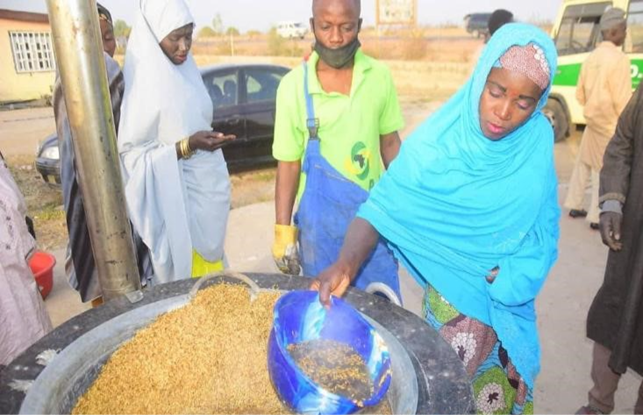Local rice parboilers who are over 70% of the local rice processing in Nigeria, use vast amounts of firewood annually in the production of local rice. The DARE institutional cookstoves, can be used for industrial cooking, as well as par-boiling of rice, grains, oil processing, shea butter, etc It can be powered by biomass; dried agricultural waste like corn hubs, rice husks, kernel shells, sticks and small branches.
DARE Institutional Cookstove Rice Parboilers

Local rice parboilers who are over 70% of the local rice processing in Nigeria, use vast amounts of firewood annually in the production of local rice. This traditional rice par-boiling method is a major source of deforestation and environmental pollution. In many instances, the rice is over-parboiled as it lacks a proper heat control mechanism. This also compromises the quality of rice produced.
The DARE institutional cookstoves, can be used for industrial cooking, as well as par-boiling of rice, grains, oil processing, shea butter, etc It can be powered by biomass; dried agricultural waste like corn hubs, rice husks, kernel shells, sticks and small branches. The inside of the wood-saver rice parboiler is insulated to retain heat and enable fast cooking by over 70% compared to open firewood cooking. It is locally fabricated using local materials. Hence a rich curriculum content for youth skill development. The par boiler is multi-functional as it can be used for larger cooking and parboiling.
With a minimum capacity of 200 liters, it has a lid cover to prevent atmospheric debris from dropping into the pot (compared to open parboiling). Over 80% savings on firewood is estimated based on field trials. The stove also eliminates harmful smoke. DARE's business model is the same as her SBD solution.
The rice parboiler have been deployed for other use apart from rice parboiling, it is being used in big restaurants, boarding schools and hospitals in parts of Kaduna, Kano and Katsina. Over 200 of the rice par-boilers have been developed and installed in parts of the country
The stove is constructed from durable military-grade thermal efficient alloy, capable of achieving 72 thermal efficiencies during the heating process as compared to 9.1% achieved by traditional methods. DARE is renounced for its hands-on expertise in the design and installation of locally made energy-efficient solutions. They have an accumulated experience of over 15 years on energy-efficient solutions for grass root communities. The solution aligns property with the clean cooking initiative of the government to improve clean cooking in Nigeria. The solution also has a very strong economic sense, saving up to 80% of firewood usage and indirect costs compared to traditional open firewood.
DARE has trained over 50 youths in the fabrication and installation of rice parboilers. They have also worked closely with the rice association in parts of Nigeria like Katsina and Kaduna to test-run the parboilers. The vast use of rice parboilers can be used in the processing of other major stable and cash crops that are normally processed with dirty practices such as open firewood use for palm oil sterilization, palm oil segregation, as well as Shea butter parboiling and others.
The opportunities for improved institutional parboiling across a variety of agricultural production are huge, especially among smallholder farmers in areas with vast deforestation and energy deficits. The need to expand the waste to energy is on the increase and institutional parboilers such as this, can bridge a wide gap for smallholder farmers and processors using waste from farms to create heat for parboiling in a very efficient manner.

